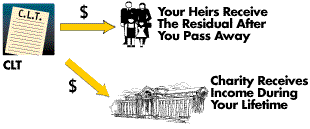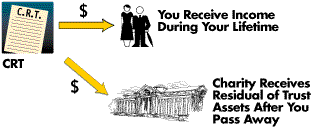
What to Give
There are a number of ways of documenting gifts, based on when and how the gift is made. Charitable gifts can be documented in such a way as to achieve the following timing options:
· Outright gift now
· Gift of income now but retain right to principle
· Gift of principle now but retain right to income
· Outright gift at death

Outright Gift Now – Outright gifts made during your lifetime provide immediate tax savings (income and capital gains taxes), eliminate the asset from your estate (minimizing or eliminating estate taxes) and enable the recipient ministry to begin benefiting from the gift right away.
Gift of Income Now But Retain Right to Principle – If you want to
begin now in providing financial support for the ministry but you want to
retain your right to the principle, that can be done. It is usually done by
creating a Charitable Lead Trust.
Under the Charitable Lead Trust the Hawaii Baptist Foundation will
invest the principle and give the income to the ministry you designate. At the end of the stated number of years or upon the death of the donor, the principle of the trust can revert to the donor or their estate where it can go to heirs or charitable causes as provided for in the trust or in the donor’s will.
Estate and gift taxes are saved on the value of the payments to the charity during the donor’s lifetime, and may result in reducing the donor’s income taxes.


Gift of Principle But Retain Right to Income – Common instruments to achieve this result are Charitable Remainder Trusts and Charitable Gift Annuities (CGAs). Similar tax and other benefits apply to both instruments. Assets are given to an intermediary that contracts to make income distributions to the donor until their death. Upon their demise, the gift is passed on to the charitable cause specified by the donor.
With Charitable Remainder Trusts, assets are placed in trust with the Hawaii Baptist Foundation, and the HBF provides the donor or his/her designee with a distribution amount each year (which may be done on a quarterly basis). Under a Charitable Remainder Annuity Trust (and a CGA), the distribution amount is a percentage of the principal contributed to the trust.
Charitable Gift Annuities operate similar to Charitable Remainder Trusts, but are documented with less extensive standard provisions and are usually used for gifts between $5,000 and $100,000. The Southern Baptist Foundation (SBF) has extended to Hawaii Christian stewards the opportunity to obtain a CGA from the SBF, with the eventual beneficiary of the gift being Hawaii Christian causes. Go to Charitable Gift Annuities to learn more about this opportunity.
Charitable Remainder Trusts and Charitable Gift Annuities are thought of as “win-win” ways of giving. Often the donor has appreciated assets that are providing little current income. If the donor gives the assets to charity, the charity sells the assets without the need to pay capital gains taxes, and the charity can provide periodic distributions to the contributor based on investing the sales proceeds. Often the donor is able to deduct a portion of the gift in computing income taxes and a portion of the periodic income is not subject to income taxes.
The donor wins by being able to make a gift to charity, avoid capital gains taxes, get more current income, and save taxes on ordinary income. The charity wins by having the use of the gift after the income payments to the donor or their designee are over.

Outright Gift at Death - It is fairly simple for a person’s will or trust to state that upon their death, a stated portion, a stated amount, or the residual of their estate after providing for heirs, be given to a charity. The Hawaii Baptist Foundation can receive such outright gifts and pass on funds to the ministries or other charitable causes selected by the donor.
To begin thinking about how you might give more than you ever thought possible to the Lord’s work through your will or trust, the Foundation invites you to consider tithing your estate, giving an equal share, or giving your estate twice, as described at Christian Giving Approaches.
